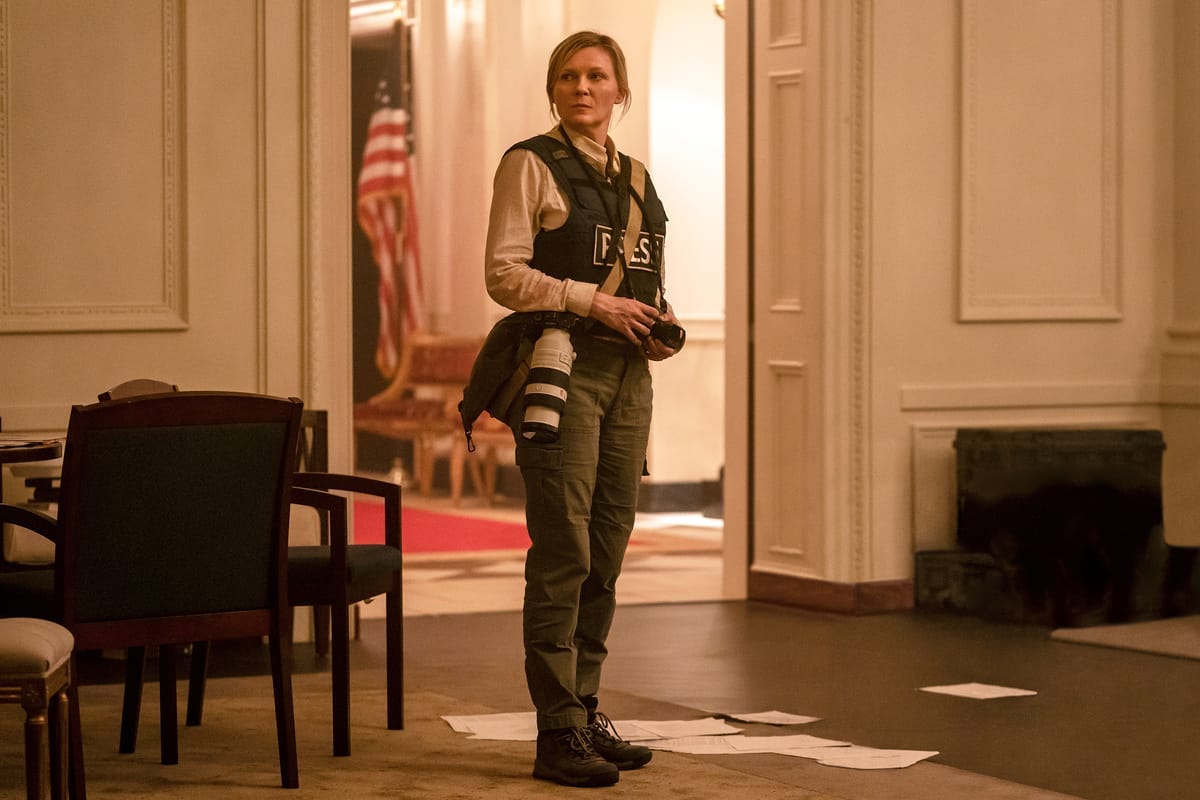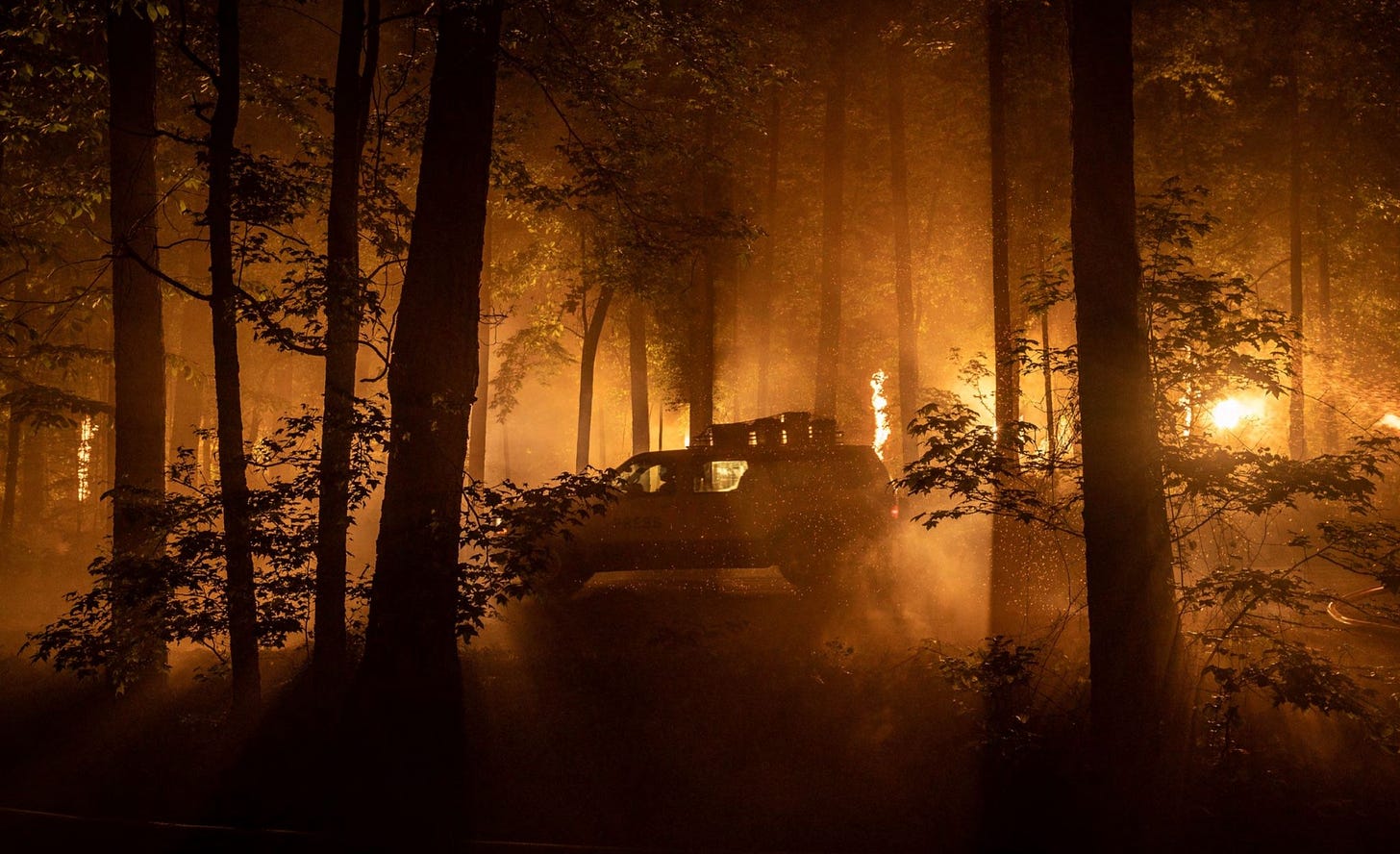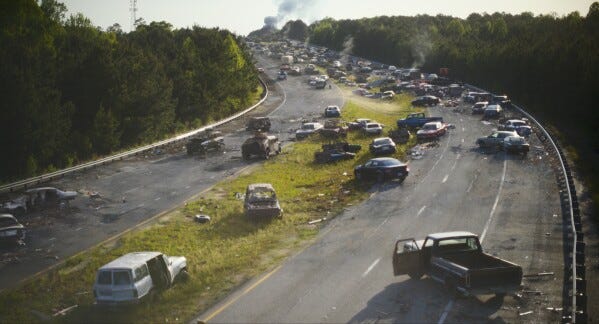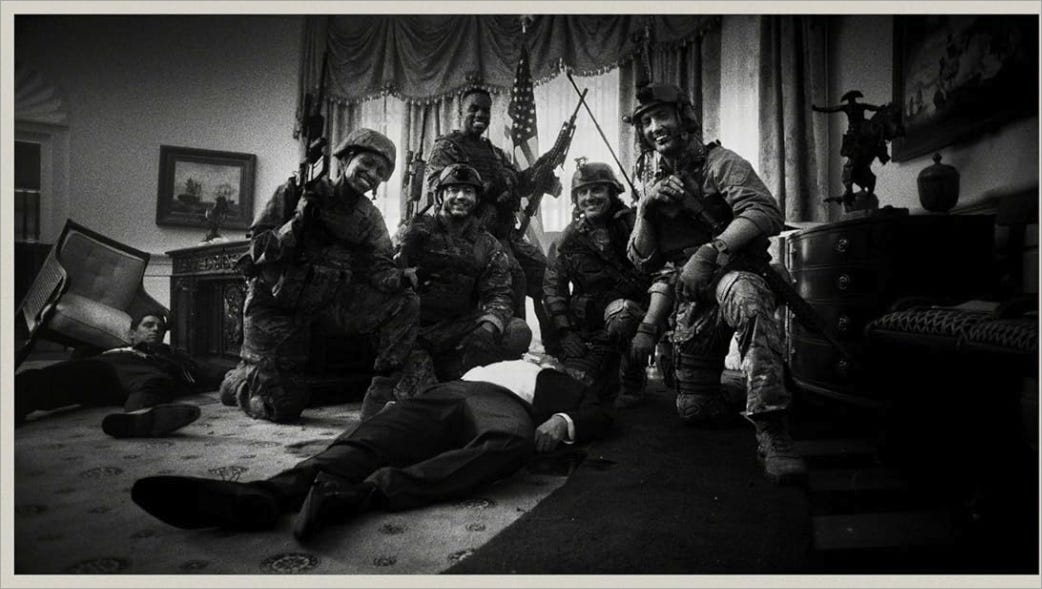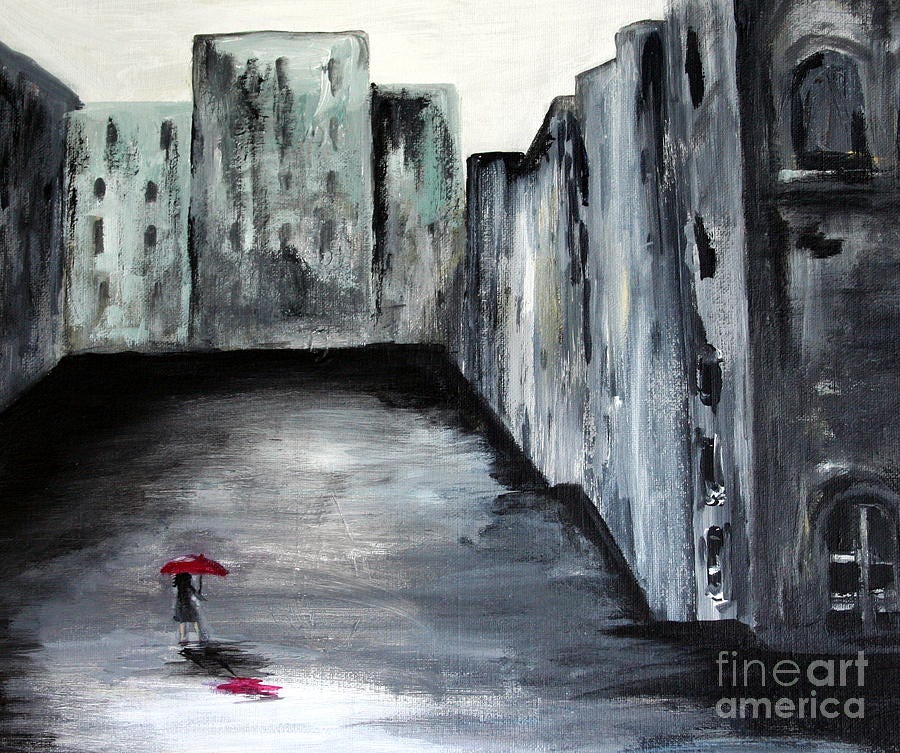We walk among crowds, but at heart, we are wolves of the wilderness. We seek our kind, yet we will never be tamed." Hermann Hesse
Last year definitely spoiled everyone with a plethora of great and/or fun movies like Barbie, Oppenheimer, Anatomy of a Fall, Poor Things, John Wick 4, Godzilla Minus One, All of Us Strangers, Guardians of the Galaxy, Vol 3., American Fiction, etc. This year has been quite different so far. While I haven’t seen every movie on the popular top 25 or top 50 lists, the only one that truly stands out from the perspective of greatness is Alex Garland’s movie Civil War. I loved Deadpool and Wolverine (and I will finish and publish God’s Perfect Idiot essay as soon as I re-watch the movie), it was an unexpected surprise at how good was Mad Max: Furiosa and how bad was Dune 2. I’ve written about Civil War not once, but twice and yet I have to return to the topic for one essay.
What makes Garland’s new film so incredibly clever is the way that it both revels in and abhors our fascination with the idea of United States of America knee deep in terror, conflict, and violence. The film is set in the near future where a combination of a fascist President and secessionist movements have fractured the country into multiple armed factions. Smoke rises from cities; the highways are filled with walls of wrecked cars; suicide bombers dive into a crowd lined up for water rations; death squads, snipers, and mass graves dot the countryside. How we got here, or what these people are fighting over, is mostly meaningless to the point of the movie even though there was so much criticism over the movie lacking a political point of view lost in bothsideism. It’s absurd of course, but the point here is not to make us feel much or to pick a side, but rather to ask why we don’t feel the same about the fascist takeover seen across the country and the world while most just shrug their shoulders. The terror, conflict, and violence kind of chaos has become all too real over the past few years, with more than 40 percent of the country in a 2022 poll saying they think a civil war is likely within the next decade.
However, Civil War is also a road-trip movie as four journalists drive the 500-plus miles from New York to D.C., running into situations that test the code of objectivity to which they’re supposed to abide. It is really just a ghastly travelogue through the war-torn Eastern seaboard, with the protagonists confronted at each stop on their journey with more and more examples of how the lines between the opposing sides and their ideology get blurry and then completely disappears. Visually, the movie perfectly supports the core ideas while keeping the viewers enthralled and engaged in the new American carnage. The audio, however, is just as important to perfectly building the suspense while desanitizing us through the brutal violence so that at the end we are meant to feel nothing when WF soldiers execute the fascist President.
I’ve been a fan of movie soundtracks for a long time and there have been a lot of films ranging from truly great to proper piece of crap that provided us with great and memorable soundtracks1. Quite often a single song would stand out and be associated with the movie essentially forever:
Bryan Adams, "(Everything I Do) I Do It for You" in Robin Hood: Prince of Thieves
Survivor, "Eye of the Tiger" in Rocky III
Whitney Houston, "I Will Always Love You" in The Bodyguard
Coolio feat. L.V., "Gangsta's Paradise" in Dangerous Minds
Eminem, "Lose Yourself" in 8 Mile
Seal, "Kiss From a Rose" in Batman Forever
Dooley Wilson, “As Time Goes By” in Casablanca
For the purposes of this essay, though, I’ll stick to the movies and soundtracks contemporary to my cinematic experience. This is why you won’t see The Spinal Tap or Purple Rain mentioned below. The four most recent movies with amazing soundtracks in my not so humble opinion, just happen to be from the four great comic book movies: The Watchmen, Scott Pilgrim vs. The World, The Guardians of the Galaxy, Vol 1, and The Black Panther. Each one great in quite a different way.
The Guardians of the Galaxy’s Awesome Mix Vol. 1 occupies a unique place as it’s not just a feel good soundtrack, but it’s an actual plot point in the entire trilogy. Vol. 1 is full of groovy songs you know by heart: they’re the kind of songs that formed the core of oldies radio like Blue Swede’s “Hooked on a Feeling,” Redbone’s “Come and Get Your Love,” and Rupert Holmes’ “Escape (The Piña Colada Song).” How do you make comic book film with a talking raccoon and an anthropomorphic tree feel believable? You build an awesome mixtape of Sixties and Seventies classics and it works!
Black Panther’s soundtrack stands as an indelible monument to how great the movie itself was. It is a record made by arguably the most critically acclaimed rapper of his generation and it’s excellent, by the way, even if its excellence differs from Kendrick’s standard fare. The Album understands all the ways a drum can talk. It conveys the infinite formats of African existence. Linking artists from Canada, California, South Africa, and the United Kingdom, Kendrick renders blackness as global and multifaceted.
Including Scott Pilgrim vs. The World almost feels like cheating my own rules as the movie is about musicians and literal battles of the bands. Yet this rom-com where most of the characters have the fighting talents of a shonen manga and are either up-and-coming or already famous musicians. Most of the bands in Scott Pilgrim vs. The World are played by real musicians from 2000s-era indie rock: Beck created Sex Bob-Omb’s coarse and amateurish sound within 72 hours but Metric’s “Black Sheep,” played by the fictional Clash at Demonhead, is the film’s crown jewel. We didn’t need a movie full of early-aughts indie rock but we got it and it was beautiful and will age incredibly well.
It will be forever impossible for me to listen to Bob Dylan’s “The Times They Are A-Changin’” or Simon and Garfunkel’s “The Sound Of Silence” without immediately visualizing The Watchmen moments in my head. That’s a great thing as a brand new work of art is married to a slew of classic songs, coming together to produce a strong and memorable experience. The best part, perhaps is how some of the songs, like K.C. & The Sunshine Band’s “I’m Your Boogie Man,” are used out of context or have their original contexts rewritten, there’s really no way to hear such a simple, funky dance song the same way again. Leonard Cohen’s masterpiece “Hallelujah” used for the only graphic sex scene completes a similar metamorphosis, but for entirely different reasons.
The only 21st century movie soundtrack that immediately came to my mind outside of the above is The Harder They Fall. Alas, there seems to be a huge shift this century in terms of quality soundtracks when compared to the 1990’s. I won’t go into the analysis of the underlying reasons, but my spouse who knows music a myriad times better than me, thinks that it is largely due to the significant grows of music in the age of streaming over the cloud and the growing focus on TV series. She is likely right.
However, there was a period in the early Aughts that was perhaps the last hoorah of movie soundtracks outside of big blockbusters. Starting with Almost Famous at the turn of the century and including Kill Bill, Vol 12, High Fidelity, Eurotrip and many others… Almost Famous is sort of a road trip movie with the journey to the bittersweet heart of early-Seventies rock & roll. I don’t think it could have felt so achingly real without an array of songs that handily transported us back in time. Cameron Crowe’s selections perfectly tell the story on their own: the wide-eyed promise of Simon & Garfunkel’s “America,” the elegiac cautionary tale of Lynyrd Skynyrd’s “Simple Man,” and, of course, Elton John’s “Tiny Dancer.”
The 90’s were perhaps the golden age, the most amazing decade for movie soundtracks. I had to make some very tough choices to keep this essay at a reasonable length, but for that reason you won’t read about Boogie Nights, Natural Born Killers, Lock Stock and Two Smoking Barrels and many others.
Juice starred Tupac was loaded with real hip-hop at a time when movies were still going with safety of mainstream R&B. East Coast legends such as Big Daddy Kane and Eric B & Rakim appear alongside West Coast gangstas including just-out-of-the-box Cypress Hill; there’s also a jazz-flavored R&B from Brand New Heavies and N’Dea Davenport, making this a wide-ranging, body-moving document of the hip-hop scene’s early Nineties.
From the opening scene featuring orange Pontiac GTO cruising into a high school parking lot to the strains of Aerosmith’s “Sweet Emotion” to the closing road trip backed by Foghat’s “Slow Ride,” music is vital to the practically perfect mid-Seventies high school vibe of Dazed and Confused. “It’s a lot more of a rock & roll movie,” director Richard Linklater said at the time, ”That was the most fun thing, the music.” Even if your own awkward adolescence didn’t include cruising around the film’s soundtrack lets you ride shotgun in a Chevy Chevelle with the 8-track deck on full blast. Whether you're chilling in a parking lot or trying drugs for the first time in a friend's basement, music has a way of getting tied up with seemingly inconsequential memories, and Dazed and Confused understands the potency of that idea.
As much as Friday has been defined as one of the greatest stoner comedies of all time, it’s often forgotten how much of the movie is a coming-of-age tale. Friday’s soundtrack mirrors the arrested development of its protagonists: Ice Cube’s “Friday,” Dr. Dre’s “Keep Their Heads Ringin’.” But the film really succeeds with the type of retro music main characters parents were probably listening to as they did the same years before Rick James’s “Mary Jane,” Rose Royce’s “I Wanna Get Next to You.” Some things are timeless. More than a stoner classic, Friday is a testament to Ice Cube's focus, ambition, and willpower.
Perhaps the first soundtrack that completely engulfed me at the time was the brooding, black-clad Alex Proyas’ The Crow. Now, I was never really a goth kid, but when you start off with goth-rock titans the Cure’s “Burn” and then accelerate to the Nine Inch Nails offering their first ever song for a movie soundtrack, and it’s a cover of Joy Division’s uneasy “Dead Soul,” how do you not feel it through every part of yourself? The timeless dorm-room angst of Violent Femmes, Rage Against the Machine, Helmet, Pantera and of course the Stone Temple Pilots’s “Big Empty”, makes The Crow a textbook example of the ’90s movie soundtracks peppered with brooding cover songs. Even though “it can’t rain all the time,” the soundtrack definitely makes you feel otherwise.
There are very few directors who can seamlessly and perfectly arrange music, including reframing of many oldies as Quentin Tarantino. In Pulp Fiction, which should have won the best picture of the year, the surf classics like Dick Dale’s “Misirlou” and the Lively Ones’ “Surf Rider” transform to be so much deeper than beach jams. Al Green’s “Let’s Stay Together” takes on a seedy undertone; Dusty Springfield’s “Son of a Preacher Man” accrues a simmering erotic tension, and Urge Overkill’s Neil Diamond cover “Girl, You’ll Be A Woman Soon” will never again be heard without an image of Uma Thurman singing along, snorting heroin, and dropping dead, even if just for a moment. Tarantino approached the score of his film the way skillful rap producers approach sampling, digging up and recontextualizing lost gems from the vinyl era and sets a gold standard for great movie soundtracks.
Trainspotting and its soundtrack mirrored the effects of its subject matter: a brief high followed by self-annihilating consequences. Danny Boyle’s soundtrack inspired clash of indie and club tracks curdled into an ensuing wave of beery laddiness. The movie brings back Iggy Pop’s “Lust for Life” and Brian Eno’s “Deep Blue Day,” transforming a dive down the worst toilet in the world into a transcendental reverie. Despite its cultural baggage, the Trainspotting soundtrack endures because—unlike others of the era—it’s ecstatic, not angsty, and captures a generation’s brief flash of blind optimism despite all evidence to the contrary.
Romeo + Juliet, a silly mid-Nineties recasting of Shakespeare would have never worked without a soundtrack that felt every bit as contemporary. Garbage’s sultry, trip-hop-inflected “#1 Crush” set the perfect tone, and Everclear’s “Local God” added an element of sneering, while the Cardigans’ “Lovefool” radiated sleek bubblegum-pop bliss. The soundtrack is really a perfect even if a bit angsty snapshot of '90s pop culture.
Good Will Hunting defied the established expectations and standards of soundtracks by incorporating music of the then indie folk’s best-kept secret, Elliott Smith. Smith agreed to allow use four of his gleaming, fragile, somber songs, and wrote the original “Miss Misery.” I still feel that it is a travesty that Elliot Smith lost the Best Original Song award to the unstoppable force that was Celine Dion’s “My Heart Will Go On,” but it was a huge moment, indie rock wearing its heart on its sleeve on cinema’s biggest stage. It's easy to forget how moody a film Good Will Hunting is given the eternal bro-ness of the Damon-Affleck couple, but Smith's mournful voice adds heaps of depth to the narrative. The soundtrack itself offers as a primer for Smith's catalogue with other eclectic selections sprinkled in: Al Green, Luscious Jackson, the Dandy Warhols. But it's really all about Smith and it is perfect.
A movie as enigmatic and unsettling as David Lynch's Lost Highway, a trancelike exploration of the dark underbelly hidden beneath the surface of Los Angeles, needs an appropriate soundtrack, and this one delivers by Nine Inch Nails, Marilyn Manson, and two bangers from Rammstein. The atonal bop of NIN's "Perfect Drug," written for the movie, and the deep, chest-vibrating bass of Rammstein's "Heirate Mich" are bookended by David Bowie's haunting, melodic "I'm Deranged," which ties the movie's frayed ends neatly together as Lost Highway speeds down its endless empty road.
Adapting classic literary texts into modern-day high-school scenarios was a big thing in the Nineties. Cruel Intentions came from an 18th-century novel Les Liaisons Dangereuses and yet it immediately felt contemporary and relatable with the soundtrack of Placebo, Blur, Skunk Anansie, Aimee Mann and Counting Crows.
For a while I felt that we’ve lost the art of a great soundtrack unless it was a big summer blockbuster or a movie directed by Tarantino or Guy Ritchie. Civil War, with an incredibly atypical six (6!!!) songs long soundtrack proved me wrong. Garland amassed a collection of esoteric but perfectly compatible songs and arranging them for key moments.
(SPOILERS AHEAD)
The first needle drop comes courtesy of Silver Apples, an underground electronic duet that first performed in the late 60s and then again in the mid 1990s. The song perfectly matched the movie’s cold opening with the State of the Union address by Offerman’s fascist President. “Rocket USA” by Suicide enhances the need to dodge burnt out cars and snake through checkpoints, all while the dissonant electronic beat throbs overhead. “Say No Go” by De La Soul plays after the first firefight in the movie, where we’re not even sure who the fighting parties are, even though one side is wearing uniforms while the other is dressed akin Boogaloo Bois in hawaiian shirts. The disconnect between sugary yacht rock and more forward-thinking hip hop, mirrors the disconnect between the disturbing imagery and the upbeat choice of song. One of the more unforgettable moments in the movie.
“Sweet Little Sister” by Skid Row accompanies a moment of extreme vehicular mayhem and is the perfect hair metal backing for a moment of true recklessness. There’s really not much else to say. “Breakers Roar” by Sturgill Simpson, which happens to be the most contemporary song in the movie accompanies perhaps the most calm yet incredibly emotionally charged moment in the film while driving through a forest on fire. Dying Sammy stares out the window as the burning embers, float gracefully towards ground - it’s gorgeous, but in a deeply disturbing way. There’s so much sadness in that moment – and indeed in the song – that deepens the sequence. Finally, “Dream Baby Dream” by Suicide is pretty much perfect. And its deployment at the very end of “Civil War,” following the fall of democracy and one of the more chilling final lines in recent memory, is absolutely peerless. The lyrics to the song about keeping that flame burning only add to the power of the scene and the moment. The flame has been extinguished. The dream is dead. But it’s also good to have dreams.
How can a road trip movie, though, have only 6 songs and be so amazing and perfect?
Well there are two reasons for that.
First is Garland’s ability to weave music with the rest of the audio that throttles your emotions and thoughts from the opening scene through the very end. From perfect silence to the loud gunshots, from chilling devastation on the screen to the emotional shock at how quickly we all can lose any sense of humanity in the world engulfed by chaos and violence. I am willing to bet that if Garland included more songs, it would have significantly diluted the accompanying sound throughout the movie. It simply had to be a very short soundtrack that perfectly conjures the depth of cognitive and emotional weight from the discourse presented in the movie.
Second, and this was a surprise for me, even though I thought of myself as an movie expert and believed to have seen a ton of great road trip movies with amazing soundtracks that make you feel like you are riding shotgun with the windows down while rolling down an empty road, there actually is a very serious lack of good road trip movies. I’ve searched and searched and searched and searched and searched and searched and searched and here’s the extend of “good” road trip movies:
Easy Rider
It’s a Mad, Mad, Mad, Mad World
Almost Famous (see above)
Dumb and Dumber
Planes, Trains, & Automobiles
Thelma & Louise
Midnight Run
O Brother, Where Art Thou?
Fear and Loathing in Las Vegas
Little Miss Sunshine
Zombieland
Sideways
Road Trip
Rat Race
Harold & Kumar Go to White Castle
Rain Man
Borat
The Adventures of Priscilla, Queen of the Desert
Besides Almost Famous and perhaps O Brother, Where Art Thou? none of these have a memorable or even a decent soundtrack. Which shocking as the idea of a road trip, at least in my crazy mind, is directly associated with music. I mean, I am sure I am not the only one who used to make mixed tapes and burn CDs and now creates Spotify playlists for the sole purpose of a having a perfect soundtrack to go along with a long drive. Yet, it seems that Civil War, six songs or not, might be the best road trip movie in terms of the music, how well it integrates with the premise and how relevant it might be a decade from now.
I am fairly sure that the Academy will not even nominate Garland’s instant classic much less win any major awards such as Best Picture, Best Director, Best Original Screenplay, etc. Yet I hope that perhaps in the bullshit attempt of objectivity and fairness the Academy might nominate Civil War for the it’s sound and especially it’s music.
For purposes of this essay I am speaking only about soundtracks rather the musical score. I am also skipping the admittingly great sing-alongs from Disney animation like The Lion King, as well as biopics about musicians (from Doors to Ray to 8 Mile to Straight Out of Compton to Bohemian Rhapsody).
I could make an argument that practically every Quentin Tarantino movie belongs on the list of best soundtracks. It’s almost like he has an innate talent to bring a perfect sound to the story. There are a few directors like that with various degrees of success through their careers, from Richard Linklater to Guy Ritchie to Edgar Wright to Wes Anderson.





